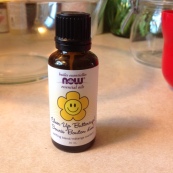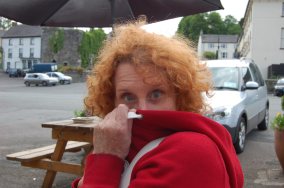Greetings Bunnies. Yes, it’s been a while. And why is that, exactly? Well I have to confess…I was giving my attention to another creative love interest. You see, I’m a bit obsessive when it comes to creative projects. I have an idea and well…yeah. It all becomes a bit “my preciousssss” but thankfully without the hair loss and manky teeth.
As many of you know, I’ve been chugging away on rewriting the first draft of a YA Sci-fi/Fantasy novel. I’ve had a lot of people say to me “So, when’s your novel coming out?” as if it’s as simple a matter as sitting down at the computer, mug of coffee in hand, watching rainbows of perfect prose flow onto the page, then sending your shiny novel off to an agent, who is positively starstruck by your genius and before you know where you are, your book is on the shelves of all your favourite bookstores and you are a NYT bestselling author.
Uhhh…no. not exactly <cries>
I wrote a first draft. It took me about three months and was an amazing experience. 131,000 words, all mine, a story that gave me goosebumps and characters that I loved like they were real people, some days even more so.
But editing and rewriting? Taking out the scalpel and “killing your darlings”? ugh. My mother had an expression: “you make a rod for your own back.” Which basically means I’m a masochist. Let me give you an example. I had a wonderful prologue that was going to tie everything together, the characters were interesting, and I put them in all kinds of life-threatening and heart breaking-then-mending situations. They were the cornerstone to the whole saga. They were where everything began and the story couldn’t happen without them. Absolutely couldn’t … nuh-uh.
It was all perfect.
Until I gave the pages to my husband to read and he loved it.
…Wait, what?
No, you didn’t read that wrong. He loved it. In fact he loved it so much that he wanted more. He wanted more of those characters.
But…but…they weren’t even the main story. They were just the warm-up act – the opening band. It was then I realised that I was in trouble. Like Indiana Jones trapped in a pyramid with snakes trouble. I’d written an incredible backstory, but it wasn’t the actual story (and a 30 page prologue is a bit of a no-no …<nervous laugh>) What the heck was I doing, anyway? I had no freaking clue what I was doing. Even U.S. Immigration would only refer to me as an “aspiring writer” until I had something published that they’d actually heard of (and apparently a MSc. thesis on heterophyllous buttercups doesn’t count – meh, there’s no accounting for taste but that’s a whole other story).
So back to what was rapidly becoming a nervous breakdown in progress…I cut the prologue. (Saved it, yes. Love it still. Maybe I’ll eventually publish it as a novella.) Now the story started where it should, right? We meet the main protagonist, what my writerly friends call the “FMC” (female main character), in Chapter 1. And what a chapter that was. I laughed, I cried…it was awesome. So was chapter two – heartbreaking, emotional…so, so shiny my precious <ahem, sorry, where was I?> Oh right. Even Chapter 3, where I sneak in all that pesky exposition? Ahhhhh. Sculpted for weeks, months – polished to within an inch of its life. As good as it was going to get (before an editor gets hold of it, anyway).
I sent those three chapters to a friend to read, and once again got hubby to give me his honest opinion (and as an aside, don’t ever ask him if an outfit looks good on you unless you want an honest answer. You do get used to that kind of honesty and it can be invaluable once you stop freaking out). The response was universal. It’s great, but what’s the story about? Well, for crying out loud! I’m getting to that…can’t you see? It’s right here in chapter 4…
…Oh, wait…
That sound of screaming? That’s chapters 1-3 joining my beautiful prologue in the pile of exiled darlings. God, you’re all gorgeous, but you do diddly to tell the actual story. You are, what they refer to in writing circles as a runway. Yep, the literary equivalent of Fred Flintstone frantically flapping his feet down the tarmac.
On the upside, getting my novel down to the publisher-preferred 100,000 words is super easy when I cleave off a 30-page prologue and the first three chapters. And maybe I actually am getting the hang of this writing a novel business when I can shove that protective, fanged ego out of the way for a minute and see what’s not working. So onward to Chapter 4, or as I now like to call it: Chapter 1.
And to those of you who keep reading chapters for me, only to have me say “Well thanks so much, but I’ve actually cut that chapter from the book?” I’m so, so sorry. It will stop eventually – hopefully before the story becomes a haiku written on a cocktail napkin.
Ooh…now there’s an idea….











 I’ve discovered a mixture called “Cheer Up Buttercup” by Now® Solutions, that contains orange, lemon and bergamot in a slightly different blend, that would work very well in the scrub. Or, in the spirit of Valentine’s Day, perhaps a more sensual blend like Naturally Loveable oil blend (also by Now®) with jasmine, ylang-ylang, lemon, orange and sandalwood. Don’t like citrus? Skip the lemon zest and citrus oils and try lavender essential oil, one of my favourites for calming and soothing the senses.
I’ve discovered a mixture called “Cheer Up Buttercup” by Now® Solutions, that contains orange, lemon and bergamot in a slightly different blend, that would work very well in the scrub. Or, in the spirit of Valentine’s Day, perhaps a more sensual blend like Naturally Loveable oil blend (also by Now®) with jasmine, ylang-ylang, lemon, orange and sandalwood. Don’t like citrus? Skip the lemon zest and citrus oils and try lavender essential oil, one of my favourites for calming and soothing the senses.
 twice, and yet despite so many tough experiences-perhaps because of them-she truly appreciates the good in her life. She doesn’t think of herself as a victim; she is a fighter, proud of who she is and all that she has overcome and accomplished; travelling the world, raising her children, starting new careers.
twice, and yet despite so many tough experiences-perhaps because of them-she truly appreciates the good in her life. She doesn’t think of herself as a victim; she is a fighter, proud of who she is and all that she has overcome and accomplished; travelling the world, raising her children, starting new careers.